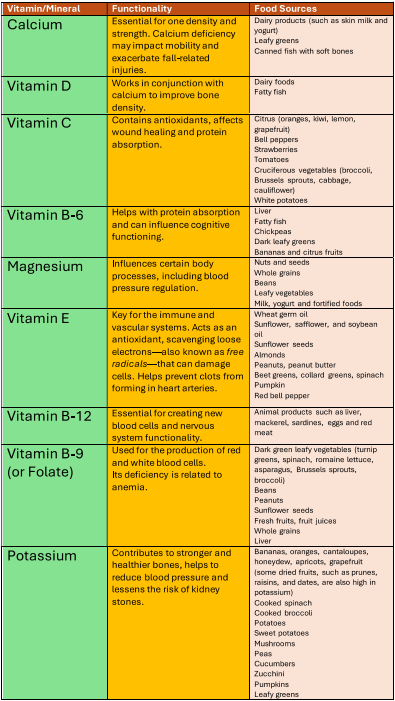By Luciana Mitzkun, Senior Care Consultant
Back in fourth grade, when we learned about vitamins and their importance for the optimum functioning of different body systems, most of us can still remember our teacher declaring: “But you do not have to worry about it, because you already consume enough vitamins through your daily meals.” While that may have been true for us, then children, it is certainly not true for older adults.
Now we know that as we age, we tend to experience deficiencies in certain vitamins and minerals. Take vitamin B-12, for example. The body’s ability to absorb it often declines after age 50, because we produce less stomach acid, which is needed to break B-12 down from natural food sources. Deficiencies in additional vitamins in the B-complex (particularly B-6 and B-9) become increasingly common with age which can affect cognition, balance, and mental health, including in relation to depression and anxiety.
In the case of vitamin D, aging skin is less able than younger skin to process sunlight into the vitamin. Lower levels of vitamin D, in turn, affect the body’s ability to absorb calcium.
While it is still possible to obtain all the vitamins and minerals through foods, it becomes increasingly difficult to eat enough foods from each related vitamin source to properly reach the recommended levels as we age.
Older adults are more likely than younger people to experience deficiencies in the nine vitamins and minerals in the following table. If we consider the food sources for each one of them, we realize that proper consumption is, at best, quite challenging:

Doctors are aware that vitamin deficiencies are common in older adults. Very often they include tests to measure certain vitamins and minerals levels in their patients’ routine checkups, and often they prescribe supplementation.
Recently, researchers have stumbled upon the specific benefits of supplementation with multivitamins for cognition in older adults.
In a meta-analysis of 5,000 participants age 65 and older, multivitamins showed benefits for memory and global cognition.
Researchers of the COcoa Supplement and Multivitamin Outcomes Study (COSMOS) report that taking a common, inexpensive multivitamin that you can buy over the counter can slow cognitive decline associated with aging by as much as two years.
The study was originally designed to research the effects of Cocoa extract, which is a source of flavanols found to lower vascular risk factors in previous small, short-term trials. Scientists at Mass General Brigham compared people 65 years and older taking Cocoa extract, multivitamins, and placebo, in a series of three studies.
The two first studies in the series revealed that for people taking Cocoa extract or placebo there was no effect in cognition, while surprisingly, those taking a multivitamin daily scored higher on cognitive tests. And the benefits were substantial!
In the third study, which compared those taking multivitamins to those taking a placebo, the scientists again observed cognitive benefits — evidenced through cognitive testing of memory, attention, logic, and language. The overall data shows that people taking a daily multivitamin for up to three years slowed cognitive brain aging by two years.
A demonstrated two-year delay in cognitive decline is as impressive as it is unprecedent. In contrast, lecanemab, the only drug known to date to slow down the progression of Alzheimer’s disease, only does so for six months. And only for the few patients who fit into the limited set of qualifying conditions for the treatment.
The study findings open a door for a new strategy that, in addition to a healthy lifestyle, could benefit all older adults: a safe affordable, accessible, and effective cognitive preserver.
Futher research is being designed to provide answers to some of the new questions brought up by these findings. It is not known if multivitamins are supplementing already adequate levels of these vitamins and nutrients in older people or if they are correcting deficiencies — or both? Although cognitive benefit was found to be greater for those who had lower diet quality indicating that supplementation with multivitamins is even more important for those in the lower socioeconomic spectrum, more information is needed before a public health policy can be formulated.
It is also unknown which specific vitamins or minerals in the multivitamin used in the study are the most beneficial for brain functioning, or whether long term use of multivitamins would lead to even greater benefits for the brain. The COSMOS study only spanned 3 years.
While we are eager to find more information on this topic, many of us older adults are already taking daily multivitamins. In fact, 70% of US adults age 60 and older take at least one dietary supplement daily, with multivitamins being the most common. The ones used in the study were Centrum Silver®, supplied by Pfizer Consumer Healthcare (who did not have any say on the designing of the study.)
Always consult with your doctor before starting any supplements. But if you are concerned about cognitive health and how to delay cognitive decline as we age, it may be a good idea to have this conversation with your doctor during your next visit. The preventative strategy should be tailored to each one’s individual needs, and it may include choices as simple as taking a multivitamin or eating more mackerel. Either way, this is good news.

